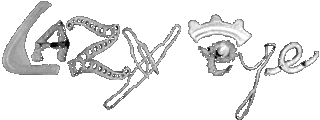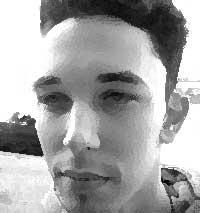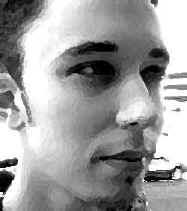

lazyhome reviews hype webboard


| Sean Whalen
describes his "studio" like it's Matthew Broderick's bedroom in War Games.
Crammed in with his bed and drum set are four computers, an array of high-tech hardware,
lots of cables. Visions of Keanu Reeve's apartment in The Matrix. Whalen is 19. He lives at home. His music has nothing to do with what you grew up with. Lynryd Skynryd, Led Zeppelin, Van Halen. Nothing but a blank stare. Whalen is digital. Zeppelin is vinyl. He's a teen-aged mad genius computer musician. Don't call it Electronica, and don't ask what it is. It's all online, if you care to know. And free. Want the latest track from Whalen's Lucidity project? No problem. Just download it from www.MP3.com. Totally free. Except for the cost of the computer, of course, and online service and phone lines or coax lines or T1 lines. It's all digital. You won't find it at Homer's. At least, not yet.
|
 |
| Is the future of music: MP3? Computer geeks like Whalen? Digital? It's at least one person's vision of the future -- Whalen's, and his unseen comrades who live their lives on the 'net. They don't care if the local radio stations play their digital creations. They're connected by e-mail address lists. They don't meet at record stores, or clubs, or raves. They don't meet, period. They type their thoughts on computers in bedrooms and dorm rooms and offices around the world and send them over the wire. It sounds pretty cold, electric and sterile, except for the music. Whalen has three tracks online right now at www.MP3.com/lucidity, his MP3 artist page. "Hazed" is my favorite – a rhythmic drum-and-bass experimental send-up that will loosen your sinuses with the right pair of speakers and proper volume setting. He calls it "a digital sushi bar of breakbeat action." It's what's happening in the next generation of Electronica or Techno -- two labels that Whalen says have no business being used to describe his music. "Every artist hates those terms: Techno and Electronica. If someone said it sounds like Techno, I'd probably think that they don't listen to electronic music very often," Whalen said from his blue-felt cubical at one of Union Pacific Railroad's downtown offices, where the Internet wonderboy does all kinds of website, Cold Fusion and Java programming. Don't ask me what it all means. It's way too high-tech for your typical computer layman. But obviously not for Whalen. Forget about the expensive recording studios, crooked record label execs and Burger King-encrusted roadtour "gigs." With just his knowledge of computers, experience playing drums at Creighton Prep and a weird, otherworldly sonic imagination, the black-mopped cyber-teen has managed to record and make available to anyone with Internet access his unique and often mesmerizing form of music. All from the confines of his bedroom.
|
|
 |
 |
|
| Creating electronic music is often a one-person show -- one guy or girl doing his or her thing on a complex of computer hardware, connected with an umbilical-chord-like wire to a set of black headphones. Whalen's no different. Writing songs (if you can call it that), he says, is a solitary task that involves finding the right samples and sound effects, followed by an hour or so of laying down 80 percent of a song's foundation. "The old 'Legacy' side of it ends for the last 20 percent," he said, referring to old DOS technology. "The final process involves several different programs, EQ tweaking, adding reverb and other effects." Up to 16 tracks are poured into one stereo wav file that's mastered, compressed and posted to the Internet as an MP3 file. That's right – MP3, the gloomy shadow that hangs over the entire record industry like a phantom menace. You can post MP3 tracks on any Internet website that has the capacity to handle large computer files, then download them for free in their perfect, digital form. Whalen and thousands of other musicians use www.MP3.com because posting is cheap and easy, involving little more than filling out some online forms and uploading the file with a web browser. "It gives you a centralized location on the 'net for people who are interested in your style of music," Whalen says. "It cuts out the middle man and brings you into direct contact with an audience you may never meet, or know." Call it a stealth scene, so underground that it's invisible. This is music you won't likely hear on the radio, ever, at least not in Omaha. Whalen says he got pulled in by Prodigy, The Chemical Brothers and Orbital, eventually graduating to his big influences: Aphix Twin, Squarepusher, DJ Crush and DJ Shadow. |
|
|
"I started taking on the electronic culture mindset," he said. "I wanted to listen to the technically best music out there that would grab me emotionally. I'm a total computer nerd, just one of those guys who sits in his basement and writes music for himself." He has no base of fellow technoids in Omaha. Instead, his address resides on a lot of electronic music e-mailing lists. Is the allure the fact that the music is so obscure, so exclusive? "The underground attraction is definitely there," he said, "but anyone who's part of the culture would never cast out or give up on an artist because they went mainstream. Then again, this stuff will never be mainstream." You hear snippets of electronic music all around you. MTV's shortlived Amp series, Volkswagen commercials, soundtracks to modern-life cyber films such as The Matrix, not to mention the ever-throbbing background of your typical thrill-kill Playstation or Nintendo64 video game. But without guitars and vocals, forget about these headphones-only ambient sounds emerging as "the next big thing." "It breaks the paradigms of standard pop music. I don't think everyday people relate to it very well. There's no guitar, no vocals most of the time, it's not your standard verse/chorus/verse structure. It takes a lot of effort to be a part of it. It's got to be sought out, and you have to have plenty of time to do that." In an era when success in the music world is judged on how much money you make, how many units you move or the size of the crowd at your shows, Whalen's comfortable just knowing his tracks are available on the 'net. He doesn't do any advertising, relying instead on a "trickle-down effect" of listeners discovering his MP3 posts, then e-mailing friends and creating a vibe. "Most musicians have money as a big concern in their process, and rightfully so," he said. "For me, it's just more important to be able to express my feelings through music. The most important thing is to have others listen to it and feel the same things I feel. Going through MP3.com has attracted a lot of people who would have never heard what I'm doing in my basement." But Whalen says his music won't end on the 'net. Sidereal Records will include a Lucidity track on an upcoming compilation CD, along with tracks by other electronic outfits such as Cathari, Emotion 8, Tangelo Zamboni, Vast Active Living Intelligence System, Paper Mache Mephistopheles, and KhaOs 286. Whalen says he has a few hundred tracks in memory and would like to put out a CD by year-end. And then he might even crawl from his bedroom for a (gulp!) live performance. What can an electronic musician possibly do on stage other than select a track and hit an "enter" key? "It's something that electronic music gets criticized for," he says of live performances. "This isn't your typical house music that people dance or get into. I want to incorporate a lot of movement and add some visual elements. One idea is to throw up some Playstations and have people come up and enjoy themselves as they listen." Headphones. Computers. E-mail. Virtual underground. Video games. And, uh, no dancing. Is this the future of rock and roll?
Printed in The Reader, May 27, 1999. Copyright © 1999 Tim McMahan. All rights reserved. Photos by Donovan Beery. Copyright © 1999 Guadimaar Studios. Used by permission. |